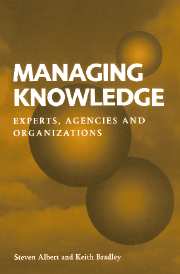Book contents
- Frontmatter
- Contents
- List of figures
- List of tables
- Introduction: the supply-side in context
- Part 1 Expert employees and their new organization
- 1 Trends in the labour market
- 2 Adaptations in the labour market and the expert employee
- 3 From the firm to the agency
- 4 Expert agency employment as a facilitator of intellectual capital
- 5 The temporal advantages of agency work for the expert employee
- 6 Taking stock
- Part 2 The labour market and the expert employee
- Appendix A Formal exposition of Winston model
- Appendix B Agency employment and search costs
- Notes
- References
- Index
5 - The temporal advantages of agency work for the expert employee
Published online by Cambridge University Press: 23 November 2009
- Frontmatter
- Contents
- List of figures
- List of tables
- Introduction: the supply-side in context
- Part 1 Expert employees and their new organization
- 1 Trends in the labour market
- 2 Adaptations in the labour market and the expert employee
- 3 From the firm to the agency
- 4 Expert agency employment as a facilitator of intellectual capital
- 5 The temporal advantages of agency work for the expert employee
- 6 Taking stock
- Part 2 The labour market and the expert employee
- Appendix A Formal exposition of Winston model
- Appendix B Agency employment and search costs
- Notes
- References
- Index
Summary
It is because I want to make economics more human that I want to make it more time conscious …
Sir J. R. Hicks, Some Questions of Time in EconomicsWe have suggested that an agency at-will contract system will develop for purveyors of specific expertise. This is because: (i) opportunities for expert employees have changed (chapter 1); (ii) organizations develop defence mechanisms which resist change and make them less attractive to specific expert individuals (chapter 2); (iii) some organizational functions such as control and monitoring are less relevant to knowledge-based employees (chapter 3); and (iv) intellectual capital is enhanced with an increase in networks associated with agency at-will contract systems (chapter 4). Together these conspire to encourage the expert employee to move away from traditional organizations towards agencies and systems of at-will contracts. It is from an economic theoretical approach that we add a fifth factor that encourages the punctuated break. This is that the temporal advantages of agency atwill contracts will result in an increase in utility for the expert employee and a qualitative improvement in the expert employee's product.
Temporal control is often reported in the economics of compensation packages as an element that would have little significance to employee/employer relationships. We take a different view and consider this aspect of work critical in the formation of new labour market arrangements. Interpreting temporal control as a marginal benefit for expert employees can, we suggest, lead to an inappropriate analysis of temporal control and the expert employee. We suggest that temporal control is an important aspect of knowledge-based work and make it central in our analysis.
- Type
- Chapter
- Information
- Managing KnowledgeExperts, Agencies and Organisations, pp. 82 - 97Publisher: Cambridge University PressPrint publication year: 1997



